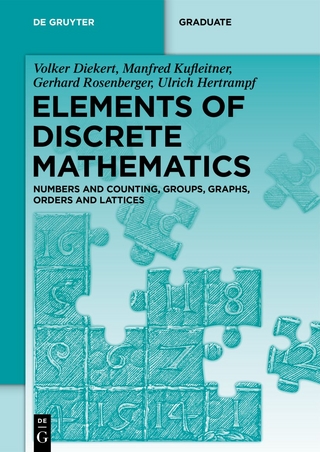Pattern Recognition on Oriented Matroids
Seiten
2017
De Gruyter (Verlag)
978-3-11-053071-1 (ISBN)
De Gruyter (Verlag)
978-3-11-053071-1 (ISBN)
Pattern Recognition on Oriented Matroids covers a range of innovative problems in combinatorics, poset and graph theories, optimization, and number theory that constitute a far-reaching extension of the arsenal of committee methods in pattern recognition. The groundwork for the modern committee theory was laid in the mid-1960s, when it was shown that the familiar notion of solution to a feasible system of linear inequalities has ingenious analogues which can serve as collective solutions to infeasible systems. A hierarchy of dialects in the language of mathematics, for instance, open cones in the context of linear inequality systems, regions of hyperplane arrangements, and maximal covectors (or topes) of oriented matroids, provides an excellent opportunity to take a fresh look at the infeasible system of homogeneous strict linear inequalities – the standard working model for the contradictory two-class pattern recognition problem in its geometric setting. The universal language of oriented matroid theory considerably simplifies a structural and enumerative analysis of applied aspects of the infeasibility phenomenon. The present book is devoted to several selected topics in the emerging theory of pattern recognition on oriented matroids: the questions of existence and applicability of matroidal generalizations of committee decision rules and related graph-theoretic constructions to oriented matroids with very weak restrictions on their structural properties; a study (in which, in particular, interesting subsequences of the Farey sequence appear naturally) of the hierarchy of the corresponding tope committees; a description of the three-tope committees that are the most attractive approximation to the notion of solution to an infeasible system of linear constraints; an application of convexity in oriented matroids as well as blocker constructions in combinatorial optimization and in poset theory to enumerative problems on tope committees; an attempt to clarify how elementary changes (one-element reorientations) in an oriented matroid affect the family of its tope committees; a discrete Fourier analysis of the important family of critical tope committees through rank and distance relations in the tope poset and the tope graph; the characterization of a key combinatorial role played by the symmetric cycles in hypercube graphs. ContentsOriented Matroids, the Pattern Recognition Problem, and Tope CommitteesBoolean IntervalsDehn–Sommerville Type RelationsFarey SubsequencesBlocking Sets of Set Families, and Absolute Blocking Constructions in PosetsCommittees of Set Families, and Relative Blocking Constructions in PosetsLayers of Tope CommitteesThree-Tope CommitteesHalfspaces, Convex Sets, and Tope CommitteesTope Committees and Reorientations of Oriented MatroidsTopes and Critical CommitteesCritical Committees and Distance SignalsSymmetric Cycles in the Hypercube Graphs
Andrey O. Matveev, Ekaterinburg, Russian Federation.
| Erscheinungsdatum | 15.09.2017 |
|---|---|
| Zusatzinfo | 15 b/w ill., 1 b/w tbl. |
| Verlagsort | Berlin/Boston |
| Sprache | englisch |
| Maße | 170 x 240 mm |
| Gewicht | 524 g |
| Themenwelt | Mathematik / Informatik ► Mathematik ► Graphentheorie |
| Schlagworte | Committee methods in pattern recognition • Committee methods in pattern recognition, hypercubes, hyperplane arrangements, infeasible systems of • Committee methods in pattern recognition, hypercubes, hyperplane arrangements, infeasible systems of linear inequalities, oriented matroids • Data Mining • Graphentheorie • hypercubes • hyperplane arrangements • infeasible systems of linear inequalities • Kombinatorik • Lineares Gleichungssystem • Mustererkennung • Oriented Matroids |
| ISBN-10 | 3-11-053071-6 / 3110530716 |
| ISBN-13 | 978-3-11-053071-1 / 9783110530711 |
| Zustand | Neuware |
| Haben Sie eine Frage zum Produkt? |
Mehr entdecken
aus dem Bereich
aus dem Bereich
Numbers and Counting, Groups, Graphs, Orders and Lattices
Buch | Softcover (2023)
De Gruyter (Verlag)
59,95 €


